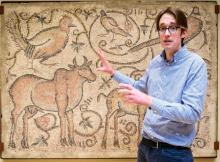Ovid’s Metamorphoses has informed several recent responses to the Anthropocene. Some see it as a source for images of human greed and arrogance; others have detected acknowledgements of the integration of human and more-than-human life in systems which could promote the flourishing of all life. The poem’s depiction of personhood and identity might seem resistant to such interpretations and consistent with a conception of personhood focused only on the human. Nonetheless, treatments of naming, of sensibility, and of relations of care between human and nonhuman animals in the Actaeon episode and elsewhere suggest a trans-species conception of personhood. When read in the light of Donna Haraway’s explorations of multispecies being, such features of the poem serve as an antidote to human arrogance. But they also warn against the (for Actaeon, catastrophic) consequences when we fail to respect the personhood of nonhuman beings.
William Brockliss is the Bradshaw Knight Professor of the Environmental Humanities, Director of the Center for Culture, History and Environment, and Associate Professor of Classics at the University of Wisconsin-Madison. He works on interactions between literary texts and the natural environment and on horror, monsters, and the monstrous in the classical tradition. His first monograph, Homeric Imagery and the Natural Environment (HUP 2019) explores how the Homeric poets responded to the characteristics of Greek flora. His new project (Horror in Ancient Epic) traces a tradition of horror across Greek and Roman epic.
To attend by Zoom, register here.
